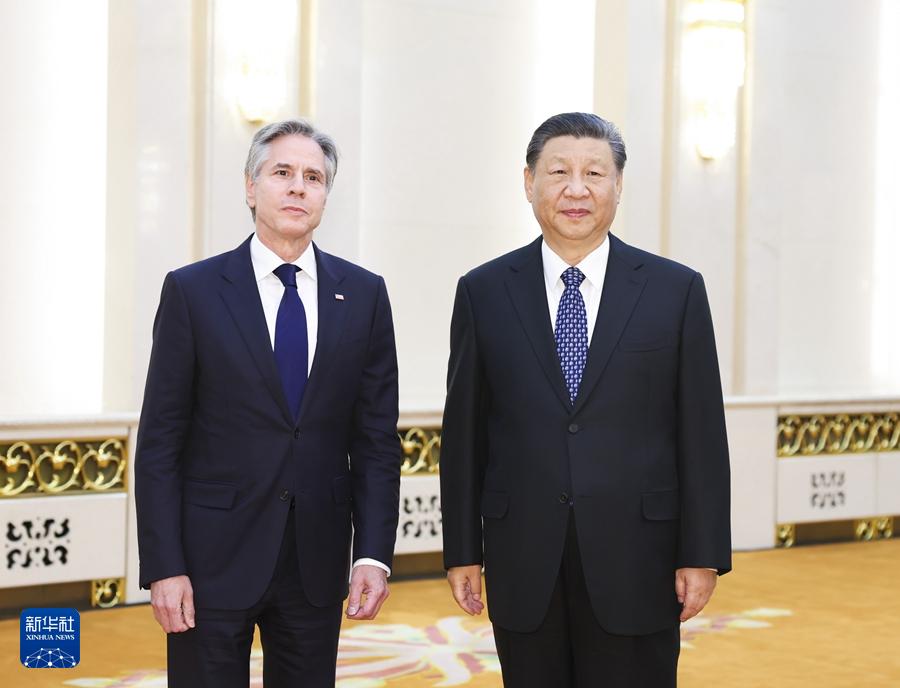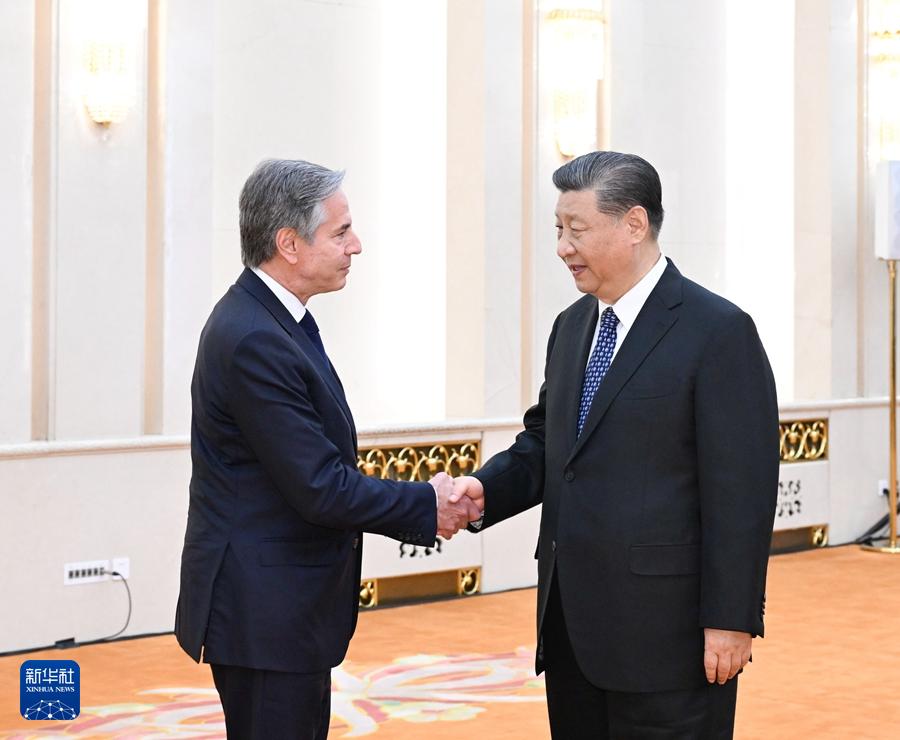We will stay firmly rooted in Chinese culture. We will collect and refine the defining symbols and best elements of Chinese culture and showcase them to the world. We will accelerate the development of China’s discourse and narrative systems, better tell China’s stories, make China’s voice heard, and present a China that is credible, appealing, and respectable.
習近平會見美國國務卿布林肯
發佈時間:2024-04-28 08:31:19 | 來源:新華網 | 作者: | 責任編輯:張芃芃新華社北京4月26日電(記者劉華)4月26日下午,國家主席習近平在北京人民大會堂會見美國國務卿布林肯。

4月26日下午,國家主席習近平在北京人民大會堂會見美國國務卿布林肯。新華社記者 黃敬文 攝
習近平指出,今年是中美建交45週年。45年的中美關係歷經風風雨雨,給了我們不少重要啟示:兩國應該做夥伴,而不是當對手;應該彼此成就,而不是互相傷害;應該求同存異,而不是惡性競爭;應該言必信、行必果,而不是説一套、做一套。我提出相互尊重、和平共處、合作共贏三條大原則,既是過去經驗的總結,也是走向未來的指引。

4月26日下午,國家主席習近平在北京人民大會堂會見美國國務卿布林肯。新華社記者 申宏 攝
習近平強調,3周前,我同拜登總統通了電話,談了對今年穩定發展中美關係的考慮,提出了雙方應該以和為貴、以穩為重、以信為本。我還強調過,“得其大者可以兼其小”。當今世界正處於百年未有之大變局,怎麼應對這個變局,這是個時代之問、世界之問。我給出的答案就是推動構建人類命運共同體,這已經成為中國外交的旗幟,也受到世界許多國家歡迎。地球就這麼大,人類面臨這麼多共同挑戰。中國古人講“同舟共濟”,我看現在需要“同球共濟”。人類社會休戚相關、福禍相依,各國你中有我、我中有你,大家應該為實現共贏、多贏凝聚最大共識。這是中國看待世界和中美關係的基本出發點。我始終認為,大國要有大國的樣子,要有大國的胸懷和擔當。中美兩國應該為此作出表率,為世界和平承擔責任,為各國發展創造機會,為全球提供公共産品,為世界團結發揮積極作用。
習近平強調,我同拜登總統舊金山會晤時,提出了共同樹立正確認知、共同有效管控分歧、共同推進互利合作、共同承擔大國責任、共同促進人文交流5根支柱。這是中美關係這座大廈應該有的四梁八柱。大的原則定了,其他問題就好辦了。中方願意合作,但合作應該是雙向的。我們不怕競爭,但競爭應該是共同進步,而不是零和博弈。中方堅持不結盟,美方也不要搞“小圈子”。雙方都可以有自己的朋友和夥伴,不要針對對方,不要反對對方,不要損害對方。中方樂見一個自信開放、繁榮發展的美國,希望美方也能積極正面看待中國的發展。
習近平強調,中國有句話,“不日進,則日退”。中美關係也是這樣。中美關係企穩的勢頭來之不易。希望雙方團隊繼續努力,積極落實我同拜登總統達成的“舊金山願景”,使中美關係真正穩下來、好起來、向前走。

4月26日下午,國家主席習近平在北京人民大會堂會見美國國務卿布林肯。新華社記者 申宏 攝
布林肯首先轉達拜登總統對習近平主席的問候,表示,拜登總統同習近平主席舊金山會晤以來,雙方在兩國交往、禁毒、人工智慧、人文交流等領域合作取得積極進展。當今世界面臨很多複雜挑戰,都需要美中兩國合作應對。訪華期間,我接觸到的美國各界在華人士也都希望看到美中關係改善。美方不尋求“新冷戰”,不尋求改變中國體制,不尋求遏制中國發展,不尋求通過同盟關係反對中國,無意同中國發生衝突。美方堅持一個中國政策,希望同中方保持溝通,認真落實兩國元首達成的舊金山共識,尋求更多合作,避免誤解誤判,負責任地管控分歧,推動美中關係實現穩定發展。
習近平請布林肯轉達對拜登總統的問候。
王毅參加會見。
Xi meets U.S. secretary of state
BEIJING, April 26 (Xinhua) -- Chinese President Xi Jinping met with U.S. Secretary of State Antony Blinken at the Great Hall of the People in Beijing on Friday afternoon.
Noting that this year marks the 45th anniversary of diplomatic relations between China and the United States, Xi said over the past 45 years, the relationship has gone through wind and rain, and the two sides can draw a few important lessons.
China and the United States should be partners rather than rivals; help each other succeed rather than hurt each other; seek common ground and reserve differences rather than engage in vicious competition; and honor words with actions rather than say one thing but do another.
Xi said he proposed mutual respect, peaceful coexistence and win-win cooperation as the three overarching principles for the relationship, which are both lessons learned from the past and a guide for the future.
Xi emphasized that in his phone call with President Joe Biden three weeks ago, he shared his thoughts on how to stabilize and develop China-U.S. relations in 2024, and underlined that the two sides should value peace, prioritize stability, and uphold credibility.
"The finer details will fall into place when they are aligned with the bigger picture," Xi said he once stressed. The world today is undergoing transformation not seen in a century. How to respond to it is a question of the times and of the world.
Xi said his answer is to build a community with a shared future for mankind, which has become a flag of China's foreign policy and has been welcomed by many countries.
Planet Earth is only this big, and humanity is faced with so many common challenges. As an old Chinese saying goes, "Passengers in the same boat should help each other," he said.
"Today, as I see it, dwellers of the same planet should help each other. We live in an interdependent world and rise and fall together. With their interests deeply intertwined, all countries need to build maximum consensus for win-win and all-win outcomes. This is the basic starting point for China to view the world and the China-U.S. relationship," Xi said.
Xi underlined his view that major countries should behave in a manner befitting their status and act with broad-mindedness and a sense of responsibility.
He said China and the United States should set an example in this regard, undertake responsibilities for world peace, create opportunities for the development of all countries, provide the world with public goods, and play a positive role in promoting global unity.
Xi underscored that in his meeting with President Biden in San Francisco, he proposed five pillars for China-U.S. relations, namely, jointly developing a right perception, jointly managing disagreements effectively, jointly advancing mutually beneficial cooperation, jointly shouldering responsibilities as major countries, and jointly promoting people-to-people exchanges.
They should serve as the underpinning for the mansion of China-U.S relations. When the overarching principles are established, specific issues will become easier to address, Xi said.
"China is willing to cooperate, but cooperation should be a two-way street. China is not afraid of competition, but competition should be about progressing together instead of playing a zero-sum game," Xi said.
China is committed to non-alliance, and the United States should not create small blocs. While each side can have its friends and partners, it should not target, oppose or harm the other, he added.
"China welcomes a confident, open, prosperous and thriving United States, and hopes the United States will also look at China's development in a positive light," said the Chinese president.
Xi stressed that as a Chinese saying goes, "No progress means regress," it also applies to China-U.S. relations.
Noting that the stabilizing trend in China-U.S. relations did not come by easily, Xi said it is hoped that the two teams will continue working actively to follow through on the San Francisco vision he and President Biden reached, so as to truly stabilize, improve and move forward the bilateral relations.
Secretary Blinken conveyed President Biden's greetings to President Xi. He noted that since President Biden and President Xi met in San Francisco, the United States and China have made good progress in their cooperation in such areas as bilateral interactions, counter-narcotics, artificial intelligence and people-to-people exchanges.
Blinken said the multiplicity and complexity of the challenges the world faces require the United States and China working together, adding that the Americans from all walks of life that he met during the visit all expressed the hope to see U.S.-China relations improve.
The United States does not seek a new Cold War, does not seek to change China's system, does not seek to suppress China's development, does not seek to revitalize its alliances against China, and has no intention to have a conflict with China, said Blinken.
The United States adheres to the one-China policy, Blinken said, adding that the United States hopes to maintain communication with the Chinese side, follow through on what the two presidents agreed in San Francisco, seek more cooperation, avoid misunderstandings and miscalculations, responsibly manage differences, and achieve stable development of U.S.-China relations.
President Xi asked Secretary Blinken to convey his regards to President Biden.
Wang Yi participated in the meeting. ■

